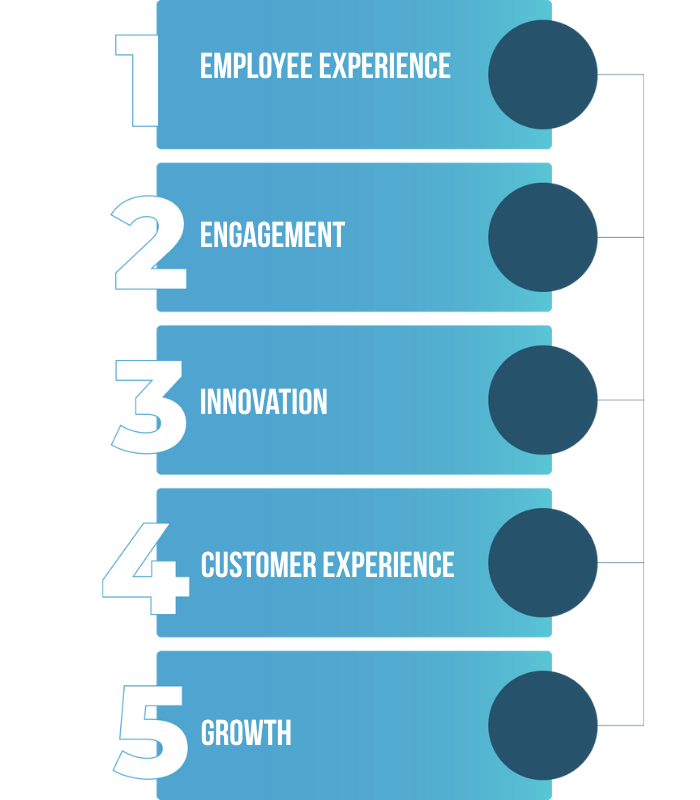For decades, CEOs have spoken the language of growth — market share, revenue, valuation. But as the world of work transforms, a new economic engine has quietly emerged, one that can’t be found in balance sheets yet determines whether companies thrive or fade.
That engine is employee experience.
Today, experience is no longer a “soft” metric buried in HR reports. It is a hard-edged business driver — one that affects everything from productivity and innovation to customer loyalty and brand equity. The organizations that recognize this shift early will lead the next era of growth. Those that don’t will find themselves outcompeted not by better technology, but by better cultures.
1. The Value Chain Has Moved Inward
The old logic of business was simple: better products and efficient operations lead to happier customers and higher profits. But in the post-pandemic, AI-driven world, the source of competitive advantage has moved inward — to the people who design, deliver, and sustain that value.
When work becomes distributed, culture becomes the infrastructure.
When automation handles the predictable, human creativity becomes the differentiator.
A 2024 MIT Sloan study found that companies with high employee experience (EX) scores outperformed peers by over 25% in profitability and twice the rate of innovation. These are not HR vanity metrics — they’re market outcomes.
The new value chain looks like this:

This isn’t philosophy; it’s economics. Experience compounds like capital — the more you invest in it, the stronger your organization becomes.
2. The Hidden Cost of Disengagement
For all the talk about culture, disengagement remains the silent tax on modern organizations. Gallup’s 2024 State of the Global Workplace report estimates that disengaged employees cost the world economy $8.9 trillion annually — roughly 9% of global GDP.
Every company pays this tax differently:
- Through higher attrition and hiring costs.
- Through slower decision-making and misalignment.
- Through customer churn caused by burned-out frontline employees.
What’s dangerous is how invisible these costs are. They don’t appear as a line item, but they quietly drag down everything else that does.
That’s why the new generation of CEOs must think of culture as an economic variable, not a moral one. Just as you wouldn’t ignore your supply chain or customer churn, you can’t ignore the experience ecosystem that powers your workforce.
3. The Data Wake-Up Call
Until recently, culture was something we could feel but not measure. That’s no longer true.
Today, every digital interaction leaves a data trail — how teams collaborate, how fast feedback loops close, how recognition flows across the organization. The challenge isn’t access to data; it’s how leaders interpret and act on it.
AI and behavioral analytics now allow us to move from lagging to leading indicators of engagement. Instead of waiting for an annual survey, we can sense shifts in morale, belonging, and collaboration in real time.
The implications are profound.
For the first time, culture can be managed like a system — continuously, proactively, and intelligently.
Just as finance teams use dashboards to monitor cash flow, leadership teams can now track experience health — spotting early signs of burnout or disengagement before they become expensive problems. This is not about surveillance; it’s about awareness. The best leaders will use data not to control people, but to understand them — to design work environments where humans can do their best thinking.
4. The New ROI: Return on Experience
Traditional ROI is linear: spend money, get output. But the Return on Experience (RoX) is exponential — because experience shapes behavior, and behavior compounds.
Consider three key RoX levers:
- Retention as a growth driver: Replacing a skilled employee can cost up to 1.5x their annual salary. Reducing attrition by even 10% can translate into millions saved — not to mention the continuity and morale benefits.
- Productivity through purpose: Employees who feel connected to company purpose are 3x more likely to be high performers. Alignment is the cheapest form of motivation.
- Innovation through belonging: Diverse, psychologically safe teams generate 19% more innovation revenue, according to BCG. Inclusion isn’t just social capital — it’s creative capital.
In short, every cultural investment yields a compound return — in engagement, creativity, and customer satisfaction. The financial math is catching up to what people leaders have always known intuitively: happy employees create healthy balance sheets.
5. Experience is the New Infrastructure
We used to think of infrastructure as physical — offices, servers, supply chains. Today, the most critical infrastructure is emotional and digital, the invisible systems that connect people to purpose.
At Swish Club, we call this the Experience Infrastructure, a foundational layer that ensures every employee feels seen, supported, and aligned, no matter where or how they work.
This infrastructure doesn’t replace human leadership; it amplifies it. It creates the feedback loops that turn good intentions into measurable outcomes. It transforms culture from a slogan into a living, breathing system. The most future-ready organizations are already investing in this layer, connecting recognition, engagement, communication, and performance into one seamless ecosystem.
In many ways, this mirrors what ERP or CRM did for business processes decades ago. Back then, digitizing finance or customer data was revolutionary. Today, the same transformation is unfolding for the employee experience. Just as every company needed an ERP to scale operations, every company will soon need an EX OS to scale culture.
6. Leadership in the Experience Economy
In the past, leadership was about clarity and control. In the new economy, it’s about connection and coherence. The CEO’s role is no longer limited to strategy or capital allocation; it’s to design the conditions where great work happens naturally. This requires a shift from managing people to managing experiences. Because in hybrid, AI-augmented environments, experience becomes the only constant people can anchor to.
Leaders who understand this will focus on:
- Transparency as the new trust currency.
- Belonging as the foundation of performance.
- Purpose alignment as the ultimate retention strategy.
In short, they will treat the employee journey with the same rigor and creativity as the customer journey — because both are part of the same economic loop.
7. The Swish Club Perspective: Turning Culture into Capital
At Swish Club, our mission is to help organizations unlock the business value of culture. We believe the future of work is not about more tools, but about smarter systems — systems that understand, adapt, and scale human connection. We built Swish Club as the Operating System for Employee Experience — helping companies move from fragmented engagement efforts to a unified, data-driven experience infrastructure. Our belief is simple: when you make culture measurable, you make it actionable. And when you make it actionable, you make it valuable. Because ultimately, the real ROI of experience is not just higher productivity or lower churn — it’s resilience, creativity, and brand love that competitors can’t copy.
8. The CEO’s New Mandate
As technology reshapes everything from how we sell to how we think, one truth remains constant: companies don’t win because they automate faster — they win because they connect deeper. The next decade will reward leaders who view culture as strategy, not support. Those who see employee experience as an investment, not an expense. Those who realize that in a world of abundant technology, the scarcest resource is genuine human engagement. It’s time to bring culture into the boardroom. It’s time to make employee experience part of the business model.
Because in the new economics of work, trust is capital, and experience is the currency.
.png)
%20(1).png)
